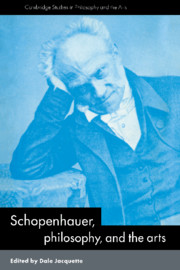Book contents
- Frontmatter
- Contents
- List of contributors
- Editor's acknowledgments
- List of abbreviations
- 1 Schopenhauer's metaphysics of appearance and Will in the philosophy of art
- PART I The work of art: Schopenhauer on the nature of artistic creation
- 2 Knowledge and tranquility: Schopenhauer on the value of art
- 3 Schopenhauer and the aesthetics of creativity
- 4 Art as liberation: a central theme of Schopenhauer's philosophy
- PART II The experience of beauty: Schopenhauer's theory of aesthetic encounter
- PART III Schopenhauer's enduring influence on the arts: idealism and romanticism
- Bibliography of selected sources on Schopenhauer's aesthetics
- Index
2 - Knowledge and tranquility: Schopenhauer on the value of art
Published online by Cambridge University Press: 05 May 2010
- Frontmatter
- Contents
- List of contributors
- Editor's acknowledgments
- List of abbreviations
- 1 Schopenhauer's metaphysics of appearance and Will in the philosophy of art
- PART I The work of art: Schopenhauer on the nature of artistic creation
- 2 Knowledge and tranquility: Schopenhauer on the value of art
- 3 Schopenhauer and the aesthetics of creativity
- 4 Art as liberation: a central theme of Schopenhauer's philosophy
- PART II The experience of beauty: Schopenhauer's theory of aesthetic encounter
- PART III Schopenhauer's enduring influence on the arts: idealism and romanticism
- Bibliography of selected sources on Schopenhauer's aesthetics
- Index
Summary
SCHOPENHAUER AND PLATO
Bertrand Russell claimed that Schopenhauer owed less to Plato than he thought he did. I want to begin by challenging that judgment. On the surface there appears little doubt as to which of Schopenhauer's revered predecessors, Plato and Kant, exerts the greater influence. A large part of Schopenhauer's philosophical vocabulary is appropriated from Kant, and he engages with him in a prolonged, detailed dialogue (seen in most concentrated form in the “Critique of the Kantian Philosophy”). There is no parallel debate with Plato. And yet a case can be made for saying that Schopenhauer's philosophy, at a deeper level, is more Platonic than it is Kantian. First, we must hold ourselves back from two related errors. We must see the invocation of “Platonic Ideas” in the third of the four books which make up The World as Will and Representation not as a kind of afterthought, but rather as a carefully prepared revelation of one of the work's most fundamental points. And we must resist the temptation to hive off this Third Book from the rest as a self-contained and subordinate piece concerning “merely” Schopenhauer's aesthetics. The Third Book must hold centre stage once we appreciate that aesthetics is at the heart of philosophy for Schopenhauer: art and aesthetic experience not only provide escape from an otherwise miserable existence, but attain an objectivity explicitly superior to that of science or ordinary empirical knowledge.
The Early Manuscripts give a fascinating insight into the genesis of a great philosophical work.
- Type
- Chapter
- Information
- Schopenhauer, Philosophy and the Arts , pp. 39 - 61Publisher: Cambridge University PressPrint publication year: 1996
- 14
- Cited by

